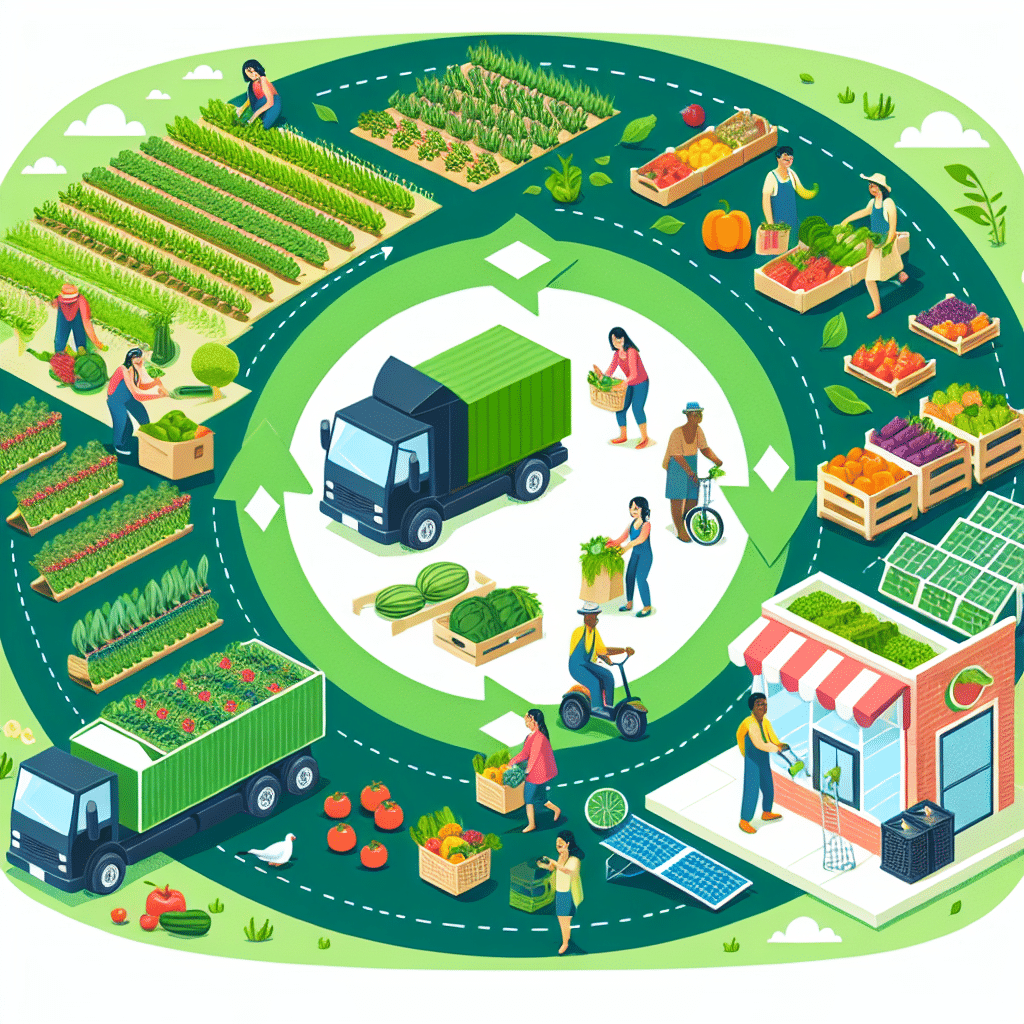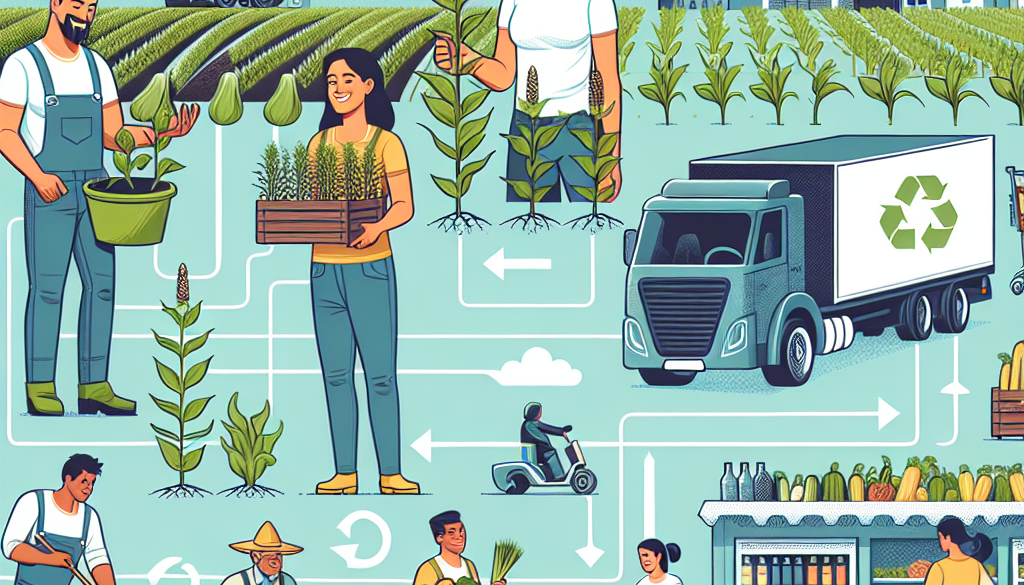Building a Sustainable Food Supply Chain
-
Table of Contents
- Building a Sustainable Food Supply Chain: Key Strategies and Innovations
- Understanding the Current Food Supply Chain
- Key Strategies for Sustainability
- Regenerative Agriculture
- Local and Seasonal Sourcing
- Supply Chain Transparency and Traceability
- Reducing Food Waste
- Innovations Driving Change
- Technological Advancements
- Alternative Proteins
- Circular Economy Models
- Case Studies and Success Stories
- Conclusion: The Path Forward
- ETprotein: A Sustainable Protein Solution
Building a Sustainable Food Supply Chain: Key Strategies and Innovations

The global food supply chain is a complex network that involves the production, processing, distribution, and consumption of food. With the world’s population projected to reach 9.7 billion by 2050, the demand for food will inevitably increase. However, current food supply chains face significant challenges, including environmental degradation, resource depletion, and social inequities. Building a sustainable food supply chain is crucial to ensure food security, promote environmental stewardship, and support equitable economic development. This article explores the strategies and innovations necessary to create a sustainable food supply chain, with examples and statistics to illustrate the potential impact of these approaches.
Understanding the Current Food Supply Chain
Before delving into sustainable practices, it’s important to understand the current state of the food supply chain. The journey from farm to fork involves multiple steps, each with its own environmental and social footprint. Traditional agricultural practices often rely on intensive use of water, pesticides, and fertilizers, leading to soil degradation and biodiversity loss. Food processing and distribution can be energy-intensive and contribute to greenhouse gas emissions. Additionally, food waste is a significant issue, with approximately one-third of all food produced globally going to waste.
Key Strategies for Sustainability
Regenerative Agriculture
Regenerative agriculture is a holistic approach to farming that seeks to restore soil health, increase biodiversity, and improve the water cycle. Practices such as crop rotation, cover cropping, and reduced tillage can enhance soil fertility and reduce the need for chemical inputs. By mimicking natural ecosystems, regenerative agriculture can also sequester carbon, helping to mitigate climate change.
Local and Seasonal Sourcing
Localizing food production and consumption can reduce the carbon footprint associated with transportation and storage. Seasonal sourcing ensures that food is consumed when it is freshest and most nutritious, while also supporting local economies. Community-supported agriculture (CSA) programs and farmers’ markets are examples of how local and seasonal sourcing can be implemented.
Supply Chain Transparency and Traceability
Consumers are increasingly interested in the origins and ethical implications of their food. Transparency and traceability in the supply chain can build trust and empower consumers to make informed choices. Technologies such as blockchain can provide a secure and transparent way to track food from farm to fork.
Reducing Food Waste
Addressing food waste is essential for a sustainable food supply chain. Innovations in packaging, storage, and transportation can extend the shelf life of food products. Additionally, food recovery programs and redistribution networks can ensure that surplus food reaches those in need rather than ending up in landfills.
Innovations Driving Change
Technological Advancements
Advancements in technology are playing a pivotal role in transforming the food supply chain. Precision agriculture tools, such as drones and sensors, enable farmers to optimize resource use and increase yields. Artificial intelligence and machine learning can improve demand forecasting, reducing overproduction and waste.
Alternative Proteins
The production of animal-based proteins is resource-intensive and has a high environmental impact. Plant-based and lab-grown proteins offer sustainable alternatives that can reduce land use, water consumption, and greenhouse gas emissions. Companies like ETprotein are at the forefront of providing high-quality, organic plant-based proteins that cater to the growing demand for sustainable food options.
Circular Economy Models
A circular economy model in the food supply chain aims to minimize waste and make the most of resources. This can include repurposing by-products, such as using spent grains from brewing to create animal feed, or implementing closed-loop systems where waste from one process becomes input for another.
Case Studies and Success Stories
Several companies and initiatives have successfully implemented sustainable practices in their supply chains. For example, Patagonia Provisions sources ingredients from regenerative organic farms, while Imperfect Foods delivers “ugly” produce that would otherwise go to waste. These examples demonstrate the viability and benefits of sustainable supply chain practices.
Conclusion: The Path Forward
Building a sustainable food supply chain is a multifaceted challenge that requires collaboration across sectors and disciplines. By embracing regenerative agriculture, local sourcing, technological innovations, and circular economy principles, we can create a food system that nourishes people and the planet. The transition to sustainability is not only an environmental imperative but also an opportunity for economic growth and social progress.
ETprotein: A Sustainable Protein Solution
In the quest for a sustainable food supply chain, the role of protein sources cannot be overlooked. ETprotein offers a range of organic bulk vegan proteins that are non-GMO, allergen-free, and have a neutral taste. Their products, including rice protein, pea protein, and various seed proteins, provide a sustainable alternative to traditional animal proteins. With a commitment to quality and sustainability, ETprotein’s offerings are ideal for food and beverage manufacturers looking to reduce their environmental impact and cater to health-conscious consumers.
About ETprotein:
ETprotein, a reputable protein and L-(+)-Ergothioneine (EGT) Chinese factory manufacturer and supplier, is renowned for producing, stocking, exporting, and delivering the highest quality organic bulk vegan proteins and L-(+)-Ergothioneine. They include Organic rice protein, clear rice protein, pea protein, clear pea protein, watermelon seed protein, pumpkin seed protein, sunflower seed protein, mung bean protein, peanut protein, and L-(+)-Ergothioneine EGT Pharmaceutical grade, L-(+)-Ergothioneine EGT food grade, L-(+)-Ergothioneine EGT cosmetic grade, L-(+)-Ergothioneine EGT reference grade and L-(+)-Ergothioneine EGT standard. Their offerings, characterized by a neutral taste, non-GMO, allergen-free attributes, with L-(+)-Ergothioneine purity over 98%, 99%, cater to a diverse range of industries. They serve nutraceutical, pharmaceutical, cosmeceutical, veterinary, as well as food and beverage finished product distributors, traders, and manufacturers across Europe, USA, Canada, Australia, Thailand, Japan, Korea, Brazil, and Chile, among others.
ETprotein specialization includes exporting and delivering tailor-made protein powder and finished nutritional supplements. Their extensive product range covers sectors like Food and Beverage, Sports Nutrition, Weight Management, Dietary Supplements, Health and Wellness Products, and Infant Formula, ensuring comprehensive solutions to meet all your protein needs.
As a trusted company by leading global food and beverage brands and Fortune 500 companies, ETprotein reinforces China’s reputation in the global arena. For more information or to sample their products, please contact them and email sales(at)ETprotein.com today.














